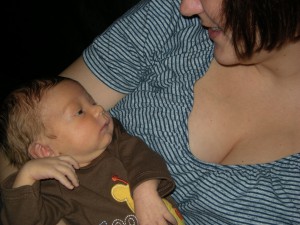 It’s a commonly held belief that women who breastfeed their babies experience bone loss at a much greater rate than women who do not breastfeed. Not only that, but the longer you breastfeed, the worse the bone loss will be. That, somehow, if we feed our baby in a way that’s biologically normal, there will be devastating consequences to our bodies. It’s never made sense to me that nature’s system for nourishing our young could lead to such devastating consequences as osteoporosis and fragile bones. Continue reading
It’s a commonly held belief that women who breastfeed their babies experience bone loss at a much greater rate than women who do not breastfeed. Not only that, but the longer you breastfeed, the worse the bone loss will be. That, somehow, if we feed our baby in a way that’s biologically normal, there will be devastating consequences to our bodies. It’s never made sense to me that nature’s system for nourishing our young could lead to such devastating consequences as osteoporosis and fragile bones. Continue reading
Category Archives: benefits of breastfeeding
Breastfeeding Dads: A Love Note
What do you think is the factor that most influences whether or not a woman breastfeeds? Her determination? Baby’s ability? Interventions during childbirth? Mother’s milk supply? Family history of breastfeeding? The answer is: None of the above. Continue reading
Think Lactation Consultants are Expensive?
 Your breastfeeding adventure is likely to have some bumps and twists and turns along the way. Some challenges, if not addressed promptly, can lead to complete cessation of breastfeeding. That’s where the IBCLC comes in. The lactation consultant in private practice bridges the gap between the place of birth and ongoing success with breastfeeding. Continue reading
Your breastfeeding adventure is likely to have some bumps and twists and turns along the way. Some challenges, if not addressed promptly, can lead to complete cessation of breastfeeding. That’s where the IBCLC comes in. The lactation consultant in private practice bridges the gap between the place of birth and ongoing success with breastfeeding. Continue reading
Breastfeeding and Weight Loss
With the arrival of the New Year many of us make resolutions about improving our health by eating better. As a breastfeeding mom, you may be wondering if it’s possible to eat well and safely lose weight while still caring for your baby.
Weight loss immediately after birth is quite dramatic. Birthing a baby, placenta and fluids can result in the immediate loss of 12 pounds or more. In the weeks and months that follow, however, your “baby weight” will come off more slowly. The good news is, most breastfeeding mothers lose weight easily, without depriving themselves of anything! In fact, many mothers find they have to eat more than they ever did before and STILL they lose weight. Those baby pounds come off like magic!
Since breastfeeding is such a great calorie burner, you may be tempted to eat a less than ideal diet. But just as in pregnancy, keep in mind you are eating for two! Continue reading
IUDs, Hormonal Birth Control and Milk Supply-Updated December, 2021
 About 6 weeks to 2 months postpartum, your health care provider will bring up the subject of birth control. Even though sex may be the farthest thing from your mind! Your doctor has your mental and physical health in mind when he talks to you about a birth control method. It can be devastating emotionally and physically to get pregnant again before you are ready.
About 6 weeks to 2 months postpartum, your health care provider will bring up the subject of birth control. Even though sex may be the farthest thing from your mind! Your doctor has your mental and physical health in mind when he talks to you about a birth control method. It can be devastating emotionally and physically to get pregnant again before you are ready.
There are many birth control methods that are compatible with breastfeeding and have absolutely zero risk of harming milk production. Condoms and other barrier methods are safe and effective when used appropriately. But these methods are considered “risky” to many doctors because they rely on patient compliance and errors can occur. More and more doctors, therefore, are encouraging new mothers to use an IUD for birth control.
There are some relatively new IUDs on the market, that can create problems for breastfeeding individuals. The Mirena., Skiyla, Liletta and Kyleena all contain small amounts of synthetic progesterone. Progesterone is the hormone that keeps you from lactating during pregnancy. It follows that progesterone, even a small amount, could cause a reduction in milk supply for a breastfeeding mother. Continue reading
